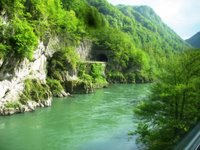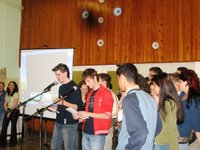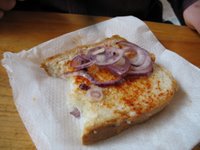
As we chugged along the bank of the Sava River, east of Slovenia's capital city Ljubljana, farmland quickly turned into densely tree-covered rolling hills and bluffs. Both of us were amazed at the natural beauty of the countryside. Nearly every hill was topped with a steepled church. Nearly all the homes were clean and in good repair (compared to parts of Hungary and Croatia, that's saying something). And behind many of the homes were small family vineyards.
 We arrived at Ljubljana Sunday evening around dinner time, went to the TI (tourist information) at the train station and got tips on where to eat and where to hear live music that evening from Alenka, then headed to the hostel Celica to check in. Celica is an old prison that has been converted into a beautiful hostel. Chad and I were on the second floor of cells. Each room is decorated differently. Ours was pretty plain (the way I wanted it...I wanted to feel like I was sleeping in a cell, not an art gallery), others were quite extreme.
We arrived at Ljubljana Sunday evening around dinner time, went to the TI (tourist information) at the train station and got tips on where to eat and where to hear live music that evening from Alenka, then headed to the hostel Celica to check in. Celica is an old prison that has been converted into a beautiful hostel. Chad and I were on the second floor of cells. Each room is decorated differently. Ours was pretty plain (the way I wanted it...I wanted to feel like I was sleeping in a cell, not an art gallery), others were quite extreme. After dinner at Fuculus (great brick oven pizza) we strolled to Prešeren Square, named for the country's most famous poet (and writer of the Slovenian national anthem...although at the time he wrote the poem that would become the anthem the country was part of the Habsburg Empire and was some 70 years from independence). Sitting on the square we tipped back a couple Unions (OO-nee-uhns), one of two beers made in Slovenia...and they're quite good (dare I say better than Hungarian beer?)
After dinner at Fuculus (great brick oven pizza) we strolled to Prešeren Square, named for the country's most famous poet (and writer of the Slovenian national anthem...although at the time he wrote the poem that would become the anthem the country was part of the Habsburg Empire and was some 70 years from independence). Sitting on the square we tipped back a couple Unions (OO-nee-uhns), one of two beers made in Slovenia...and they're quite good (dare I say better than Hungarian beer?)
The next day Chad and I took a walking tour of the city, where we learned that Slovenia was, for years, part of the Roman Empire, then part of the Habsburg Empire, then part of Yugoslavia, before finally becoming its own nation for the first time in history on 26 June 1991.
As I mentioned in an earlier post, we wanted to rent a car and head south to Piran, located on theAdriaticc Sea. Unfortunately no rental company had a cheap car for us so we took the bus. I realized that was a better option that renting a car when I started falling asleep.
 When I awoke, the bus was just passing over a ridgeline and for the first time in my life I glimpsed the Mediterraneann Sea! Really the Adreatic, it's the water that lies between Italy and the Balkann Peninsula from Greece to Slovenia.
When I awoke, the bus was just passing over a ridgeline and for the first time in my life I glimpsed the Mediterraneann Sea! Really the Adreatic, it's the water that lies between Italy and the Balkann Peninsula from Greece to Slovenia.Piran is a tiny (pop. about 2000) seaside village that looks like it hasn't been updated since medievall days. The streets are very narrow, cobblestoned, and wind every which way. Even as I write this I continue to be amazed by the thought of walking home down a narrow cobblestone street, climbing a flight of old, handcut stone steps to a flat in a building that has been sitting on that location for more than 300 years. It's a magical little village
 and, I imagine, a dream retirement location for many Slovenians.
and, I imagine, a dream retirement location for many Slovenians.Looking out across the sea, one can see the Italian city of Trieste, and if the weather is right, Venice. During the time of communism residents of Yugoslavia would travel to Trieste to purchase western goods helping that city become a sort of regional marketplace. But, since Slovenia and others gained independence Trieste has fallen on hard times. Venice, meanwhile, continues to be a tourist Mecca.
That evening we dined at an outdoor cafe overlooking the central square. Chad and I each ordered squid, mine fried, his grilled. Both were wonderful as we exchanged portions. The highlight of the meal was the mixed salad. After 5 weeks in Hungary, I realized I hadn't had a real lettuce salad during that time. Every salad I've had in Hungary has had one piece of lettuce laying on the bottom, with chopped paprikas (peppers) and onions, a few tomatoes, and possibly corn, piled on top.

That evening we stopped into a tiny pub on the tip of the peninsula, ordered a couple Unions, and sat on the patio. There we met Vladimir, a 65 year old half-Slovenian, half-Russian. He had retired a year earlier and purchased a flat in Piran overlooking the sea. If Hollywood made a movie about our trip, Sean Connery would be cast to play Vladimir. He told us all about his family history (his Russian grandfather was an officer in the Russian army before fleeing the country just prior to the October 1917 revolution. While emigrating they reached Istanbul where his grandmother said she disliked boats and headed for the nearest country where the family would be safe. That decision put them in Slovenia).
As if that story wasn't interesting enough, his Slovenia grandfather was Fritz Reiner who conducted the Chicago Symphony Orchestra from 1953-63, and earlier in his career, while teaching at Curtis Institute, found an understudy in Leonard Bernstein.
It rained the entire next day. We spent the morning in Piran sitting at an outdoor cafe sipping
 cappuccinoo and staring at the sea. That afternoon we headed back to Ljubljana via the Postojna (poh-STOY-nuh) Caves. a 200-km system of underground caverns, and a popular tourist stop.
cappuccinoo and staring at the sea. That afternoon we headed back to Ljubljana via the Postojna (poh-STOY-nuh) Caves. a 200-km system of underground caverns, and a popular tourist stop.Back in Ljubljana we returned to the same pizza place as two nights earlier, thensoughtt out a movie theater to catch a film. We found one that was playing Inside Man, in English, with Slovenian subtitles.
At 2:30 AM we boarded the train for Budapest, and eventually arrived back in Szolnok around 1:30 PM that day.
In all, Slovenia is an absolute gem of a country. We didn't have time to visit the Julian Alps and Lake Bled, but that leaves me a good reason to return.
-----------------------------------------------------------------------------------------------
As for the title of this post, there's a funny, and embarrassing story behind it:
"The only thing I know about Slovakia is what I learned firsthand from your foreign minister, who came to Texas."
- George W. Bush, to a Slovakian journalist
(Bust had actually met with Dr. Janez Drnovshek, then Slovenia's prime minister)















